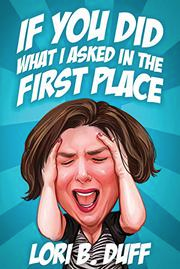
by Yona Zeldis McDonough
The Power of Humor for Smashing the Patriarchy
 Most attorneys don’t moonlight as a humorists, so Lori B. Duff’s new collection of essays, If You Did What I Asked in the First Place (Deeds Publishing), may just be a first of its kind. Duff talks to Fiction Editor Yona Zeldis McDonough about her unusual professional pairing.
Most attorneys don’t moonlight as a humorists, so Lori B. Duff’s new collection of essays, If You Did What I Asked in the First Place (Deeds Publishing), may just be a first of its kind. Duff talks to Fiction Editor Yona Zeldis McDonough about her unusual professional pairing.
YZM: How do the jobs of lawyer and comic coexist in your life?
LBD: I feel sorry for lawyers without a sense of humor. I feel like those two things are the Yin and Yang of my life. They balance each other out. The law can be so harsh. No one thinks, “I’m having the best day of my life. I think I’m going to go see my lawyer.” People come to talk to me professionally when they are at their lowest: when someone has died, when their marriages are breaking apart, or when they are in financial trouble. When you focus on those things for 40 or more hours a day, you start thinking the entire world is tragedy. It’s important to balance that by thinking about the opposite of tragedy, which is comedy. When you add to that the maxim that comedy is tragedy plus time, they are natural partners.
YZM: What are the unique features of women’s humor? Jewish humor? Jewish women’s humor?
LBD: Women’s humor and Jewish humor both tend to be self-deprecating. Women and Jews both, in American society, tend not to be in positions of power. They are both groups that have traditionally been excluded from — to quote Broadway’s “Hamilton” — “The Room Where it Happens.” Historically, we haven’t been allowed to be members of the Country Clubs and smoky back rooms where real power sits. That’s the tragedy. The genius of comedy, if you can make it work, is taking tragedy and holding it up to a funhouse mirror so it’s no longer scary, but rather funny. Like the “Riddikulus” spell in Harry Potter that takes something horribly frightening and turns it into something ridiculous. In this way, women, and Jewish women in particular, can take their status as second-class citizens and instead of whining and crying about it, they can make it funny. It’s a good way to be heard: People listen to jokes more than they listen to complaints, even when the substance is the same. Things are better than they were, of course. We have three female Supreme Court Justices now and female CEOs, and no one will say out loud, at least, that they won’t let Jews in their clubs. But the world is still based on who you know more than what you know, and finding a way to be heard when your granddaddy didn’t know someone else’s granddaddy to get a foot in the door is tough. Humor can do that.
YZM: Who are your role models in the legal world? How about in the world of comedy?
LBD: I’d be lying if I said I didn’t admire the heck out of Sandra Day O’Connor and Ruth Bader Ginsburg. Those are obvious choices, though. I’m equally impressed with people who make waves on a smaller scale. I’m friends with the first female attorney in the county where I live. Imagine how scary that must have been! We’re still waiting for the first female Superior Court Judge, which seems stunning in 2019. As for comedy, I am in absolute awe of people like Carol Burnett and Erma Bombeck. They seem somewhat old-fashioned now, but they were such groundbreakers. No one had ever done what they did before. They had tremendous talent and ovaries and no role models whatsoever. It’s hard to imagine them in 2019 as subversive, but that’s what they were in their own time.
YZM: Do you plan to follow up with another book?
LBD: Of course! I’ve already got enough material for another book of essays, but I think I may wait a little bit before putting it together. I’ve got the outline and about 25 percent of a novel written, and the idea for a sequel put together in my head. I also have the research done for a book tentatively titled, “The Plain English Legal Guide for Writers.” What I really need is a month in a cabin somewhere all by myself and I can knock it out. I type about 100 words a minute, and I write in my head all the time. By the time I sit at the computer, it’s just a matter of transcribing what is already written, so it doesn’t take long to do. The trick is being left alone with nothing else pressing, which is no small task.